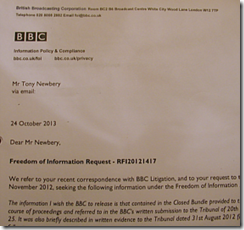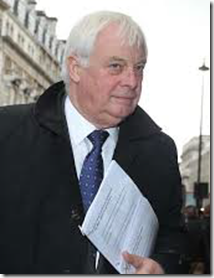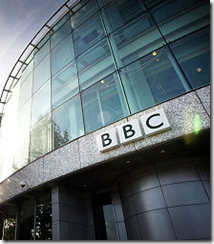 When I returned home after the Information Tribunal hearing in London, I assumed that apart from deciding whether it was worth taking further action in an attempt to get the information out of the BBC, really the last word had been spoken on the matter of the Seminar. It looked as though life might become pleasantly quiet again, for a while at least. How wrong I was.
When I returned home after the Information Tribunal hearing in London, I assumed that apart from deciding whether it was worth taking further action in an attempt to get the information out of the BBC, really the last word had been spoken on the matter of the Seminar. It looked as though life might become pleasantly quiet again, for a while at least. How wrong I was.
First there was Andrew Orlowski’s revelations about the two lay judges who sat on the tribunal, and the rather tantalising comment that he obtained from the BBC concerning grounds for an appeal.
And Andrew Orlowski was anything but finished with the story. He was still publishing reports which were picked up by Christopher Booker, James Delingpole and others.
Then the bombshell from Maurizio arrived late last Monday night, and a media storm began to develop. At the moment, if I type ‘my name’ + BBC + seminar into Google, it yields over 3 million hits. Life is not quiet at all really, but yesterday I thought that things were, at last, beginning to settle down a little. Surely nothing else could to crawl out of the woodwork?
So in rare idle moments I was exchanging comments with Maurizio on Geoff Chamber’s blog about the files that he had found on the WayBack Machine. I seemed to have a print-out of the same ten-page PDF file in which he found the participants list. The funny thing was that my September 2008 version had only had three pages: no sign of any participants lists.
One couldn’t help wondering when the file was either altered or replaced.
So in the end, Maurizio and I put a chronology together, and this is what it looks like:
(Maurizio’s contributions are in red, and mine are in black)
|
| 13/07/2007 |
|
International Broadcasting Trust (IBT) ten-page document recovered by Maurizio written after this date. |
|
|
|
|
|
| 20/07/2007 |
|
Request to BBC for information about the seminar. |
|
|
|
|
| 21/08/2007 |
|
The BBC’s response citing their derogation under the FOIA. |
|
|
|
| 05/09/2007 |
|
I send a complaint to the Information Commissioner. |
|
|
|
| 09/09/2007 |
|
Creation of ten-page IBT document recovered by Maurizio according to file properties. |
|
|
|
| 08/11/2007 |
|
IBT document recovered by Maurizio written before this date. |
|
|
|
|
|
It was a very long time before the ICO did anything more, and so far as I am aware the BBC never replied to their letter. |
|
|
|
| July 2008 |
|
Date when link to truncated IBT document became available according to Gareth. |
|
|
|
| 28/07/2008 |
|
The ICO eventually writes to the BBC asking for their side if the story. |
|
|
|
| 30/07/2008 |
|
Creation date of truncated IBT file according to file properties. |
|
|
|
| O6/08/2008 |
|
My first post at Harlmess Sky on the mattter:
Jeremy Paxman, the BBC, Impartiality, and Freedom of Information
|
|
|
|
| Sept 2008 |
|
I print out a three page document at the IBT website describing a number of seminars, including Climate Change – the Challenge to Broadcasting, but without the participants lists. |
|
|
|
| 29/09/2008 |
|
Post at Harmless Sky mentioning the IBT:
The Freedom of Information Act and the BBC’s willing little helpers
|
|
|
|
| 28/01/2009 |
|
The ICO say they are still waiting for the BBC to reply to their letter of 28/07/2008 and so I ask for a case review. |
|
|
|
| 17/11/2009 |
|
The ICO publishes a decision notice endorsing the BBC’s decision not to provide me with any of the information. |
|
|
|
| 16/12/2009 |
|
I send Grounds of Appeal to the Information Commissioner. |
|
|
|
| 19/01/2010 |
|
The ICO submits its response to my appeal. |
|
|
|
| 14/04/2010 |
|
BBC joined as a party in the appeal. |
|
|
|
| 12/05/2010 |
|
The BBC submits its response to my appeal. |
|
|
|
|
|
The speed at which the case could then be heard was determined by the progress through higher courts of Steven Sugar’s attempts to obtain the Balen Report as this sought to determine how ‘for the purpose of journalism’ should be interpreted in terms of the FOIA and therefore how the BBC derogation should be applied. |
|
|
Can anyone spot a rather startling coincidence? Sometime around the end of August 2008?
Well goodness-gracious-me! You never seem to know what’s going to happen next, do you?
So far, everyone seems to have been so transfixed by the revelations of the participants list that they have ignored any other alterations made to the information on the IBT website. So lets look at the first section of each version of the document.
Here’s the first section headed Background from the first page of the later, three-page version:
REAL WORLD BRAINSTORMS
Background
The Real World Brainstorms take place annually and are co-hosted by BBC Vision and BBC News. The aim is to bring together key decision makers within broadcasting with a mix of writers, producers and environment and development specialists to explore how we can more effectively represent our interconnected world Delegates exchange views on key issues and ideas, discussing fresh approaches to stories which impact here in the UK and around the world.
Past seminars have had enormously positive feedback, inspiring major programme seasons as well as diverse individual projects. But the meetings are not about pitching ideas – they are about making space for fresh thinking about the way the world is and how it might be represented more richly.
The seminars are organized jointly by the BBC, IBT and the Cambridge Media and Environment Programme.
3-page version
And here is the Background section from the 10-page version, with the participants list, found by Maurizio:
REAL WORLD BRAINSTORMS
Background
The International Broadcasting Trust (IBT) has been lobbying the BBC, on behalf of all the major UK aid and development agencies, to improve its coverage of the developing world. One of the aims is to take this coverage out of the box of news and current affairs, so that the lives of people in the rest of the world, and the issues which affect them, become a regular feature of a much wider range of BBC programmes, for example dramas and features. The BBC has agreed to hold a series of seminars with IBT, which are being organized jointly with the Cambridge Media and Environment Programme, to discuss some of these issues.
So far, 6 seminars have taken place. They have had a significant impact on the BBC’s output and have also provided a unique opportunity for dialogue between those working in development and broadcasters.
As a result of the success of these seminars, further brainstorms are now planned for 2008.
For a full list of delegates see attached Appendix.
10-page version
If you then have a look at the bottom of page 2, and then page three of this document, you will find sections headed The Aim, Themes, Participants and Plans for 2008, none of which appear in the later version. There are a fair number of other minor differences between the two documents that suggest routine editing, and the later document includes a description of the 2008 seminar, which had taken place some two months earlier. (3-page Version and 10-page version)
Whether all this is just coincidence, or an annual update that had nothing to do with the Information Commissioner’s letter alerting the BBC to the fact that a complaint was about to be investigated, is hard to say. But there can be no doubt that between September 2007 and September 2008 the IBT seems to have become very much less forthcoming about its relationship with the BBC, and about its agenda as lobbyists representing some of the wealthiest and most active NGOs, including Oxfam and Friends of the Earth,dedicated to campaigning for action on climate change.
Am I being too suspicious about this coincidence? The problem is that the BBC is a national institution that has traded on its reputation for integrity throughout its ninety-year history. If that reputation is compromised, then public trust is likely to be lost very quickly and very completely.
Update 24th Nov. 2012: See Gareth’s comment #17 below. It would seem that the strange coincidence of dates at the end of July 2008 in the chronology above are exactly that: a coincidence.
 In the wake of press coverage (Mail on Sunday and Daily Telegraph ) of the BBC climate seminar scandal, I posted some background to the current revelations here. This touched on connections between Tony Blair’s presidency of the G8 in 2005 and the seminar. It is worth looking at this in more detail.
In the wake of press coverage (Mail on Sunday and Daily Telegraph ) of the BBC climate seminar scandal, I posted some background to the current revelations here. This touched on connections between Tony Blair’s presidency of the G8 in 2005 and the seminar. It is worth looking at this in more detail.



 When I returned home after the Information Tribunal hearing in London, I assumed that apart from deciding whether it was worth taking further action in an attempt to get the information out of the BBC, really the last word had been spoken on the matter of the Seminar. It looked as though life might become pleasantly quiet again, for a while at least. How wrong I was.
When I returned home after the Information Tribunal hearing in London, I assumed that apart from deciding whether it was worth taking further action in an attempt to get the information out of the BBC, really the last word had been spoken on the matter of the Seminar. It looked as though life might become pleasantly quiet again, for a while at least. How wrong I was.

Recent Comments